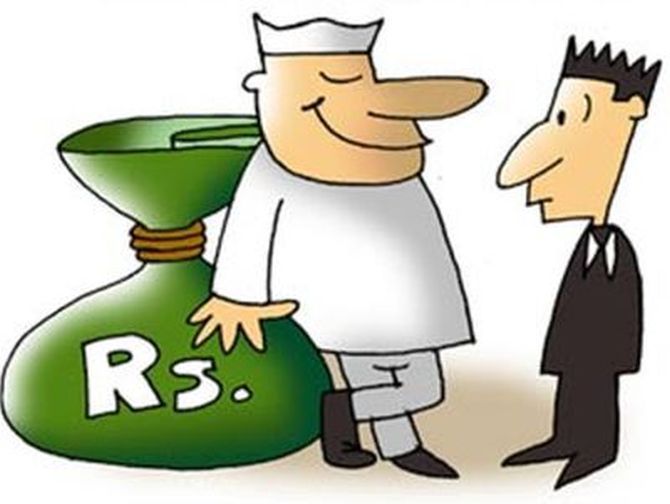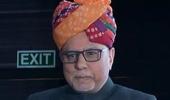While experts pointed out the impact of corporation tax cuts cannot yet figure in collections as most companies are yet to decide on their choice, government officials said a part reason for slow collection is the tax cut.
Illustration: Uttam Ghosh/Rediff.com

Collection of personal income tax and corporation taxes fell nearly 17 per cent in October, analysis of the data presented in Parliament shows.
While the Central Board of Direct Taxes had collected Rs 61,475 crore in October 2018, the mop-up fell to Rs 50,715 crore in October 2019, the data suggests.
Minister of State for Finance Anurag Thakur told Parliament on Monday, the direct tax collected in the seven months from April to October this year stood at Rs 5.18 trillion (gross collection minus refunds).
The corresponding seven-month collection figure for 2018 was Rs 5.07 trillion, data from the Controller General of Accounts shows.
The growth in the six-month period was 4.7 per cent.
This shows collection further slowed in October.
Tax collection growth depends on nominal growth in the economy, which had slumped to a 17-year low of 8 per cent in the first quarter of the financial year (2019-20).
While experts pointed out the impact of corporation tax cuts cannot yet figure in collections as most companies are yet to decide on their choice, government officials said a part reason for slow collection is the tax cut.
Smaller the impact of tax cuts on this collection, larger would be the depth of the current economic slump.
Overall revenue mobilisation would also suffer.
It would get reflected, in part, in the Revised Estimates that would be presented in the Budget for 2020-21 in February next year.
“It can’t be assessed as to how much of the slowdown is because of the rate cut, but tax-relief measures do have a role in this,” said a senior government official who did not want to be named.
The government reduced the corporation tax rate for existing and newly incorporated companies to 25 per cent and 15 per cent, respectively, in late September, after the September 15 deadline for advance tax payment was over.
Amit Singhania, tax partner at Shardul Amarchand Mangaldas said it is unlikely that this is an impact of the tax cuts, as the advance tax for this quarter (October-December) would be paid in near to the December 15 deadline.
“The deadline for self-assessment tax for FY19 was extended to October 31.
"The October collection would include this, in addition to the TDS (tax deducted at source) which is collected monthly,” he said.
Corporate entities prefer to pay advance tax very close to the deadline as they save the interest on the amount in that period.
Early payment results into loss of interest and returns on that sum. He also said that many corporate entities have not yet decided on their choice.
“Given there is no growth in collections at least evidenced by the October collections, the government could be staring at a significant deficit at year end,” said Rohinton Sidhwa, partner at Deloitte.
Many companies are in the process of setting up new subsidiaries to avail the 15 per cent corporation tax rate for new manufacturing companies, experts said.
Some of them also said that growth in direct collection itself is a positive surprise in April–October period, as the tax cuts would have resulted in a grimmer picture.











